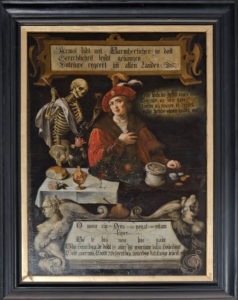Thoughts on Sunday’s Lessons for Aug. 4, 2019
First Reading (Track One): Hosea 11:1-11
Last Sunday we heard the opening verses of the prophet Hosea, an angry and startling accusation about Israel’s unrighteous path to destruction if its people don’t return to following God’s commandments.

Der reiche Mann und der Tod (The Rich Man and Death), 1622, painting by David Kindt (1580-1652). Hauptkirche St. Jacobi (St. James’ Church), Hamburg, Germany. (Click image to enlarge.)
Now, toward the end of the book, Hosea turns from anger to the softer tone of beautiful imagery. Now he envisions Israel as a child, and God as a loving but exasperated parent. God knows that the misbehaving offspring deserve punishment but isn’t willing to give up on them entirely. God’s heart recoils when Israel turns away, but God’s compassion grows warm and tender. Eventually the children will come home to a happy reunion.
First Reading (Track Two): Ecclesiastes 1:2, 12-14; 2:18-23
“Vanity of vanities! All is vanity.” In reflecting on this familiar passage in the mysterious book of Ecclesiastes, think of “vanity” in the sense of the original Hebrew word: “breath” or “vapor,” something barely visible that veils the light. We spend our lives futilely toiling under the scorching sun in pursuit of something that we can’t grasp, the poet sings: “chasing after wind.” The first-person narrator, “I, the Teacher” (Qohelet in Hebrew) ,is traditionally understood as King Solomon, but the book was almost certainly written long after the people’s return from exile, centuries after Solomon.
Psalm: (Track One): Psalm 107:1-9, 43
The people returning home from exile might have sung a hymn like this one, hailing God’s compassion despite Israel’s ingratitude. Three times in nine verses the people praise God’s steadfast love, a poignant Hebrew word – “chesed” – that connotes compassion, faithfulness, kindness, mercy, and grace. Take special note of Verse 9, praising God who gives drink to the hungry and fills the hungry with good things, a duty that we hear again in the Magnificat, the song of Mary, and in Jesus’ words in Matthew 25.
Psalm: (Track Two): Psalm 49:1-11
Foreshadowing the parable of the foolish rich man in today’s Gospel, we hear a Psalm that shouts out the foolishness of trust in riches. High or low, rich or poor, we can never ransom ourselves or deliver to God the price of our life, the Psalmist sings. We can never earn enough to ransom our lives when our time comes. No one has enough riches to buy life forever, never seeing the grave. Rich or poor, wise or dull and stupid, all together come to the grave.
Second Reading: Colossians 3:1-11
In our fourth and final week with the letter to the Colossians, the author proclaims that once Christ is revealed in our lives, we are called to put away evil ways and clothe ourselves in a new life in Christ. In words similar to Paul’s invitation to the Galatians to put away all differences among humankind, we are reminded that “there is no longer Greek and Jew, circumcised and uncircumcised, barbarian, Scythian, slave and free.” Once we are raised with Jesus and connected with each other in baptism, such earthly differences as race, religion, gender, class and culture no longer matter. Our new life in Christ is one in all.
Gospel: Luke 12:13-21
The rich man in Jesus’ parable became wealthy through his work, planning and careful investment. He has an enviable retirement plan, having stored up sufficient property and earnings to ensure him a merry life of ease. Yet God calls him a fool, and it’s not hard to see the reasons why. Most obviously, the rich man failed to consider that we never know when we’ll die. He focused his life on saving for a future that he’ll never see. Even more important, he was greedy. He never gave a thought to others. He did not love his neighbors as himself. Jesus – who reminded us that what we do for the poor, we do also for him – has little patience with those who think only of themselves.
What are “Track 1” and “Track 2”?
During the long green season after Pentecost, there are two tracks (or strands) each week for Old Testament readings. Within each track, there is a Psalm chosen to accompany the particular lesson.
The Revised Common Lectionary allows us to make use of either of these tracks, but once a track has been selected, it should be followed through to the end of the Pentecost season, rather than jumping back and forth between the two strands.
For more information from LectionaryPage.net, click here.
